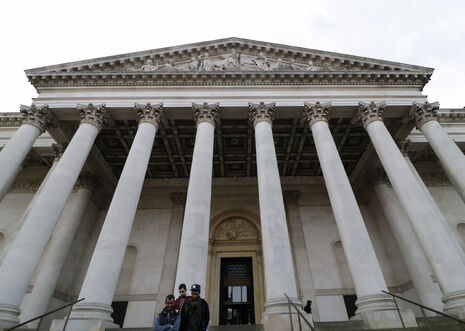The ‘Table of Tables’
As term begins proper, now is the time to take advantage of the opportunities Cambridge has to offer

This week came the announcement that Cambridge has, for the seventh-year running, ranked first in The Times Higher Education’s ‘Table of Tables’, which is compiled by allocating points based on rankings in other well-known league tables. The ‘Table of Tables’ is also known as the ‘Ranking of Rankings’. It’s difficult not to be cynical. What does it mean, for us, as individuals, to be part of what the league tables claim is the best university in the country?
Moving on from the first frantic week of Michaelmas, now is the time that we settle into new routines, and fall into the habits and activities which will come to shape our term. Yet we need not feel that, as Freshers’ Week fades into a hazy memory, the opportunities to meet new people, take up new hobbies and pursue new ideas have passed us by. You need only look to this week’s magazine section to get a sense of the seemingly-unlimited cultural opportunities Cambridge has to offer.
A major Degas retrospective has opened at the Fitzwilliam Museum (pp.26-7), the Theatre section is beginning to fill with reviews and previews (p.31), and with the new term comes a new wave of student film (p.28).
But art galleries and theatres don’t make a university. The beauty and grandeur of Cambridge should not be assimilated with success. In this week’s Comment section, Anna Cardoso argues that the architectural similarity of Cambridge colleges to Eton and the Houses of Parliament can have a damaging psychological effect on young people and our perception of power (p.16).
This week, HRH Prince Edward formally opened Jesus’s new West Court, in what was Toope’s first official engagement as Vice Chancellor (pp.6-7). The college caused controversy when the Earl was accepted to read History in 1983 with the grades CDD. While our admissions and access structures have come a long way since then, we should not be complacent. CUSU welfare officers argue that “the ability to ‘be well’ cannot be disentangled from privilege” (p.18) while columnist Galaxy Henry suggests that we should look to Cambridge YouTubers as the true advocates of diversity (p.17).
Earlier this week, Toope defended his £365,000 salary, saying that such an enormous figure is “reasonable, given the scope of the job.” Toope told the The Times that, as VC, his job includes “searching for all possible sources of income, while developing the international reputation of the University”. Given the range of issues currently faced by the University, not least the need to divest from fossil fuels (p.5), we hope that this aim manifests itself in more than simply keeping us at the top of league tables
 News / Cambridge welcomes UK rejoining the Erasmus scheme20 December 2025
News / Cambridge welcomes UK rejoining the Erasmus scheme20 December 2025 News / CUP announces funding scheme for under-represented academics19 December 2025
News / CUP announces funding scheme for under-represented academics19 December 2025 News / News in Brief: humanoid chatbots, holiday specials, and harmonious scholarships21 December 2025
News / News in Brief: humanoid chatbots, holiday specials, and harmonious scholarships21 December 2025 News / SU reluctantly registers controversial women’s soc18 December 2025
News / SU reluctantly registers controversial women’s soc18 December 2025 Lifestyle / All I want for Christmas is a new hanukkiah22 December 2025
Lifestyle / All I want for Christmas is a new hanukkiah22 December 2025









